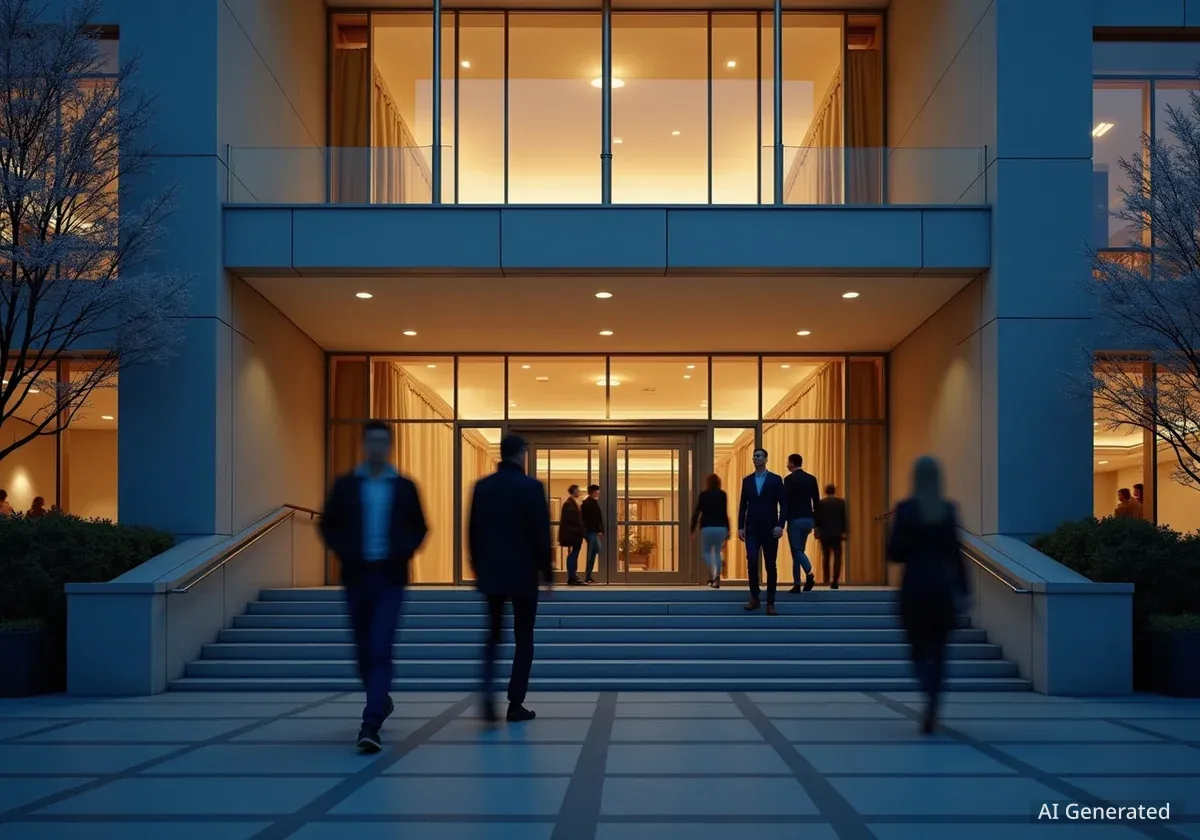A 25-year-old Algerian man has received a 43-month prison sentence and an eight-year expulsion from Switzerland for a machete attack. The incident occurred in late December on the forecourt of Bern's Reitschule cultural center, leaving a 39-year-old Syrian man with severe hand injuries. The attack highlighted ongoing safety concerns in the Schützenmatte area.
Key Takeaways
- A 25-year-old Algerian man was sentenced to 43 months in prison.
- He also received an eight-year expulsion from Switzerland.
- The attack involved a machete and seriously injured a 39-year-old Syrian man.
- The Reitschule temporarily closed after the incident due to safety concerns.
- The Schützenmatte area remains a focal point for security discussions in Bern.
Court Convicts Attacker
On Thursday, the Bern-Mittelland Regional Court found the defendant guilty. He was accused of attacking a man with a machete on December 28th, causing a near-complete severance of the victim's left ring finger. The court largely agreed with the prosecution's case and their proposed sentence.
The defendant, who had been in investigative custody for nine months, appeared in court in sweatpants and a T-shirt. He maintained his innocence, claiming his brother was responsible. "I did not hurt anyone," he stated in Arabic. He only admitted to cocaine use, which was confirmed by a urine test after his arrest.
Attack Details
- Date of Incident: December 28th
- Victim: 39-year-old Syrian man
- Weapon: Machete and crutch
- Injury: Left ring finger nearly severed
The Attack Unfolds
According to the prosecution, the incident began during an argument within a group of about ten people, mainly Arabic speakers. The defendant first used pepper spray, then grabbed a machete in his right hand and a crutch in his left. He then swung both weapons aggressively and indiscriminately towards members of the group.
Prosecutor Cesar Lopez stated that the Algerian man consciously risked causing severe injuries with the machete. The victim's left hand, raised to protect his head, was struck by the machete. This impact almost completely severed his left ring finger.
"The accused acted with violent and powerful swinging motions, striking indiscriminately at the group," Prosecutor Cesar Lopez testified.
Immediate Aftermath and Arrest
After the attack, the defendant fled the scene. Several chaotic confrontations, including fights and further pepper spray use, erupted on the forecourt. Authorities later apprehended the Algerian man near the federal asylum center, which was formerly the Zieglerspital. At the time of his arrest, he was still holding the machete, which police secured along with a pepper spray device and a crutch. The machete had the victim's blood on it.
Reitschule staff provided immediate first aid to the victim. His ring finger, which was only attached by a piece of skin, was reattached during a six-hour operation at Inselspital.
Background on Schützenmatte
The Schützenmatte area, including the Reitschule forecourt, has been a site of repeated violent incidents. This particular machete attack was described as the peak of a series of violent events at the cultural center. Following the incident, the Reitschule temporarily suspended its operations to address safety concerns.
Challenges in the Investigation
The Reitschule initially described the incident as a "deal and gang war." However, its staff declined to testify to the police or in court. This made the investigation challenging.
The prosecution's case heavily relied on the statements of two security employees. These employees are tasked by the city to ensure safety at Schützenmatte on weekends. Their detailed description of the suspect was crucial for his quick apprehension.
The exact reason for the dispute remains unclear even after the verdict. There was speculation that the convicted man might have sought revenge for his brother. His brother had been a victim of a knife attack on the same forecourt a few weeks prior.
The victim's testimony also did not fully clarify the events. Initially, in the hospital, he claimed to have heard the defendant's name twice on the forecourt. However, he could not recall this in court. He also declined a confrontation with the accused and could not identify his attacker from photos.
Defendant's Immigration Status
The convicted Algerian man arrived in Switzerland last summer. He reportedly intended to seek medical treatment. However, his asylum application was not processed because Italy was responsible for it under existing agreements. He was supposed to leave Switzerland by the end of October.
Italy has not been taking back refugees whose asylum applications it should process. This meant Swiss authorities could not place the Algerian man in deportation detention. Such detention is only possible if deportation is imminent.
"This case shows a gap that the federal legislature must close," said Bern's Security Director Philippe Müller (FDP).
A task force, established by federal and cantonal authorities, is working to find solutions for dealing with repeat offenders. The Algerian man was not on their radar as a repeat offender before this attack, partly because he had only recently arrived in Switzerland.
Ongoing Safety Efforts in Schützenmatte
Following the machete incident, Bern's new Mayor, Marieke Kruit (SP), organized a meeting between the Reitschule and the police. While the Reitschule has declined regular exchanges, the police media office states that "situational agreements sometimes occur in case of incidents, and they work."
The city is also implementing structural changes to make the Schützenmatte area safer and more inviting. Despite these efforts, police reports indicate that the number of registered violent crimes in the Schützenmatte perimeter remains similar to previous years. However, the nature of these crimes has changed.
Police noted that while December 2024 did not see an unusual increase in the number of offenses, individual acts led to more severe consequences, even with a comparable number of incidents. The Schützenmatte/forecourt area continues to be a hotspot for criminal activity and safety concerns.




